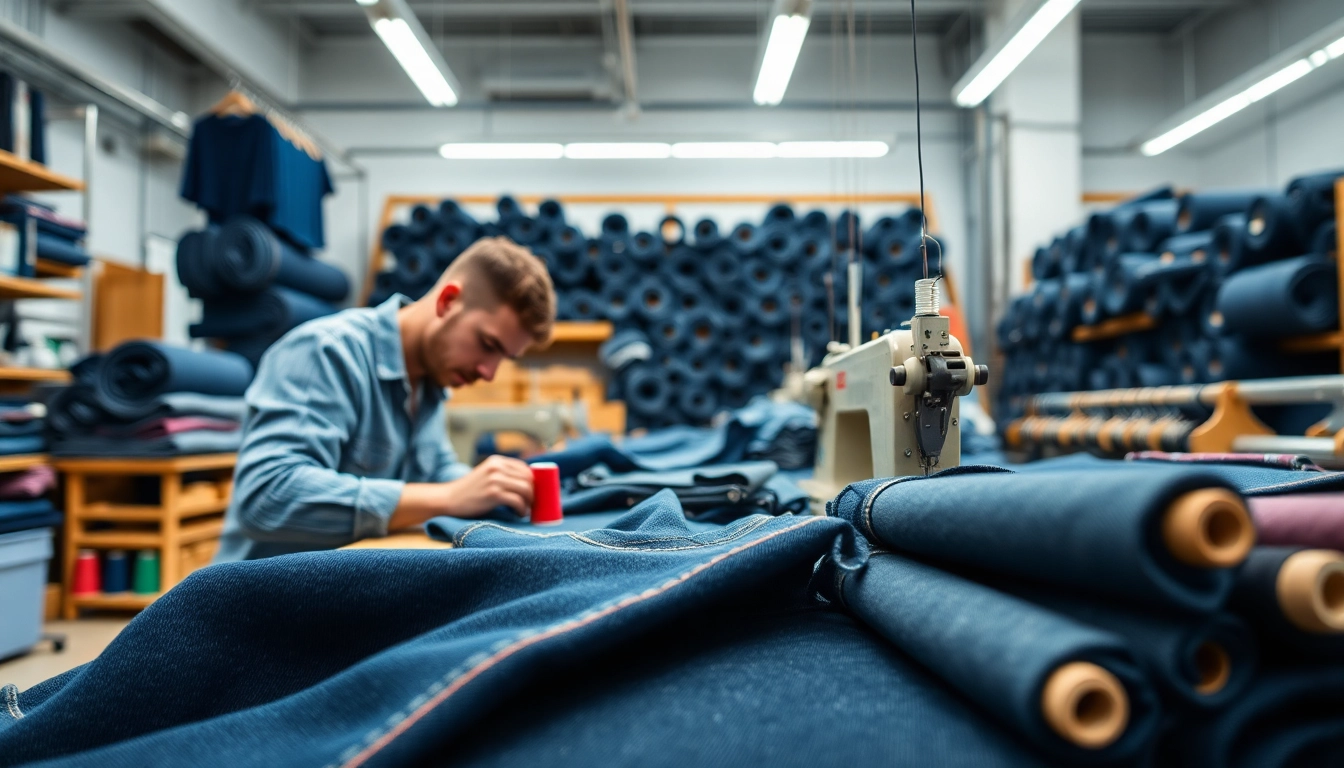Understanding Wholesale Jeans Manufacturers
What They Are and How They Operate
Wholesale jeans manufacturers are specialized companies that produce denim products in bulk for retailers and brands. Their operations revolve around the large-scale production of jeans designed to meet the diverse needs of various markets. Unlike retail manufacturers, which often focus on producing finished garments for end-users, wholesale manufacturers cater primarily to businesses seeking to resell jeans under their own labels or to stock their retail outlets. Typically, they offer customizations, allowing retailers to specify sizes, designs, and sometimes even fabric types.
The processes used by wholesale jeans manufacturers vary from company to company but usually encompass several key stages: design conceptualization, sourcing raw materials, cutting, sewing, finishing, and quality control. This operational framework enables them to maintain efficiency while also providing flexibility to cater to unique client demands.
Key Features of Quality Manufacturers
High-quality wholesale jeans manufacturers share several defining characteristics:
- Expertise in Denim: A deep understanding of denim material and its properties is crucial. Quality manufacturers are aware of different fabric types, weights, and finishes.
- Advanced Technology: Utilizing state-of-the-art machinery for cutting and stitching allows manufacturers to enhance efficiency and productivity while maintaining high standards of accuracy.
- Strong Supplier Relationships: Established manufacturers often have trusted relationships with reliable suppliers of fabrics and other materials, ensuring a steady flow of quality inputs.
- Customization Capabilities: Good manufacturers can offer a range of customization options, from fabric types to specific designs, catering to the unique needs of each client.
- Sustainability Practices: Many quality manufacturers are shifting towards sustainable manufacturing processes to meet consumer demand for environmentally friendly products.
Types of Jeans Offered by Manufacturers
Wholesale jeans manufacturers typically produce a wide variety of jeans styles. Understanding the various types can help retailers and brands make informed choices according to market demands:
- Skinny Jeans: A popular style characterized by a tight fit through the legs, often made from stretchy fabrics.
- Bootcut Jeans: These jeans are fitted at the thighs and flare out slightly at the ankle, allowing them to be worn over boots.
- Straight-Leg Jeans: Offering a classic cut that runs straight from the knee to the hem, providing a timeless look.
- Wide-Leg Jeans: Gaining popularity for their comfortable and relaxed fit, these jeans provide a stylish alternative to traditional fits.
- High-Waisted Jeans: Known for elongating the legs and enhancing the waist, these jeans are often favored in contemporary fashion.
Choosing the Right Wholesale Jeans Manufacturers
Factors to Consider in Selection
Selecting the right wholesale jeans manufacturers is a pivotal decision that can influence your business’s success. Here are some critical factors to consider:
- Quality of Products: The manufacturer’s ability to provide high-quality products is paramount. Evaluate samples and client feedback.
- Production Capacity: Ensure the manufacturer can meet your order volume needs without compromising quality.
- Lead Times: Understand the turnaround time for orders and how it fits into your inventory needs.
- Pricing Structure: Evaluate the pricing models to ensure they align with your budget and profit margins.
- Communication: Assess their communication channels and responsiveness, which are vital for effective collaboration.
Evaluating Manufacturer Credibility
Credibility is vital when choosing a wholesale jeans manufacturer. To evaluate this, consider the following steps:
- Check Reviews and References: Look for testimonials from previous clients, which provide insight into reliability and product quality.
- Certifications: Verify if the manufacturer holds relevant certifications, reflecting adherence to industry standards.
- Factory Visits: If possible, visiting the factory can provide firsthand insight into their operations and working conditions.
- Sample Orders: Placing a small sample order can help assess both quality and reliability before committing to larger orders.
Negotiating Terms and Pricing
Negotiation is crucial in maximizing the value of your contracts with wholesale jeans manufacturers. Factors to consider during negotiation include:
- Minimum Order Quantities (MOQs): Understand the minimum order requirements and whether they align with your business needs.
- Pricing Flexibility: Negotiate pricing based on order volume, potential for long-term partnership, and bulk orders.
- Payment Terms: Discuss favorable payment terms, such as down payments and payment upon delivery.
- Shipping Options: Confirm shipping options and associated costs, which can affect your overall expenses.
Quality Control and Assurance
Importance of Quality Control
Quality control in wholesale jeans manufacturing is vital to ensure that all products meet specified standards. Efficient quality control helps prevent defective products from reaching consumers and minimizes returns and complaints. Implementing robust quality assurance protocols enhances brand reputation and customer satisfaction.
Testing Methods for Denim Products
There are several testing methods used to assess the quality of denim products:
- Fabric Testing: Evaluations on fabric weight, tensile strength, and stretch are essential to ensure durability.
- Stitching Quality Inspection: Inspecting stitching for consistency, thread tension, and pattern alignment ensures longevity in use.
- Wash Testing: Exposing fabrics to laundering processes eliminates the possibility of shrinkage or color fading.
- Fit Testing: Evaluating the fit on different body types is crucial for customer satisfaction and market alignment.
Maintaining Standards Throughout Production
Maintaining quality standards involves integrating checks at each stage of the production process. Common practices include:
- Regular Training: Teaching workers the importance of quality assurance and recognizing defects helps create a culture of excellence.
- Consistent Inspections: Ongoing inspections at different production phases help catch any discrepancies early.
- Customer Feedback Loop: Incorporating feedback from retailers can provide insights for continuous improvement.
Trends in the Wholesale Jeans Market
Current Styles and Consumer Preferences
Consumer preferences in jeans are continuously evolving. Recent trends indicate a surge in demand for:
- Sustainability: Eco-friendly materials and production processes are becoming significant selling points.
- Versatility: Consumers increasingly seek jeans that can be styled for various occasions, promoting modular fashion.
- Comfort: Trends show a preference for stretchy fabrics and relaxed fits, emphasizing comfort and practicality.
Impact of Sustainability on Manufacturers
The journey towards sustainability is reshaping the wholesale jeans industry. Manufacturers are now adopting environmentally friendly practices, including sourcing organic materials, reducing water waste, and implementing recycling programs. Brands that embrace sustainability gain a competitive edge by appealing to environmentally conscious consumers.
Future Innovations in Denim Manufacturing
Innovations in denim manufacturing are set to redefine the landscape. Future advancements may include:
- Smart Fabrics: Technological integration into textiles to create fabrics that can adapt to temperature and moisture levels.
- Advanced Recycling Techniques: Enhanced processes allowing for recycling denim into new garments, minimizing waste.
- 3D Knitting: This technique can reduce material waste and create bespoke fits, enhancing customization.
Marketing Your Products from Wholesale Jeans Manufacturers
Building Your Brand Image
Creating a compelling brand image lays the foundation for success. Essential elements include:
- Unique Value Proposition: Identify what sets your jeans apart from competitors, be it quality, design, or pricing.
- Consistent Messaging: Ensure that all marketing materials communicate the same core message to enhance brand recognition.
- Visual Identity: Develop a strong visual brand identity, including logos and color schemes that resonate with your target audience.
Utilizing Digital Marketing Strategies
Digital marketing is crucial for reaching potential customers effectively. Strategies to implement include:
- Social Media Marketing: Utilize platforms like Instagram and Facebook to showcase products and engage with your audience.
- Email Marketing: Create campaigns that notify customers of new arrivals, sales, and tailored suggestions.
- Search Engine Optimization (SEO): Optimize your online content to enhance visibility and attract organic traffic, focusing on relevant keywords like wholesale jeans manufacturers.
Connecting with Your Target Audience
Building authentic customer connections fosters loyalty and encourages repeat purchases. Effective methods include:
- Customer Engagement: Host events, workshops, or online forums to engage customers directly and understand their needs.
- Personalized Customer Experiences: Use data analytics to tailor experiences that resonate with individual customer preferences.
- Feedback Systems: Implement systems to gather customer feedback and utilize it to refine products and services continually.



